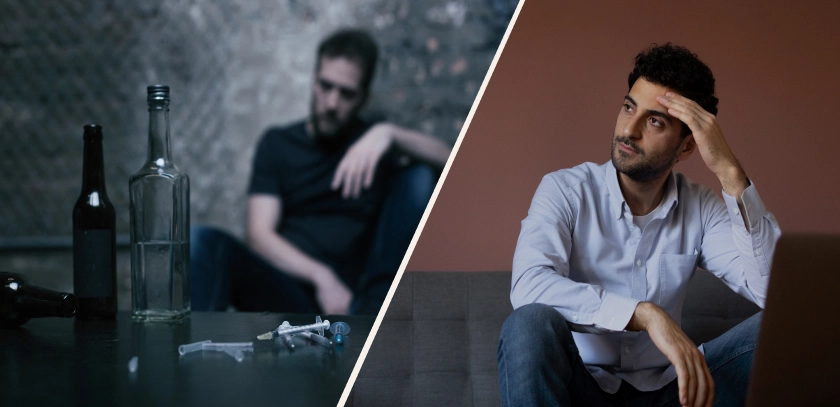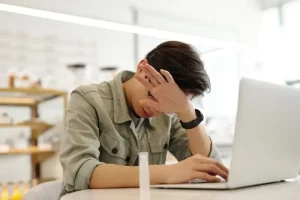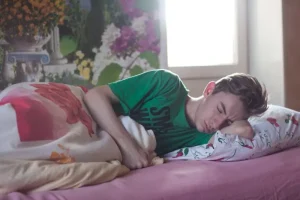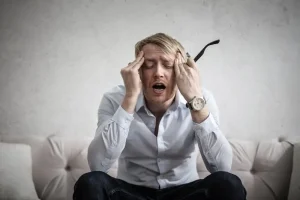
The link between alcohol and anxiety has gained significant attention in recent years, as researchers explore how drinking impacts mental health. Many individuals turn to alcohol as a means of relaxation or socialization, yet there’s growing concern about its relationship with anxiety. Mental health experts suggest that while alcohol may initially provide a sense of relief or relaxation, it can exacerbate anxiety symptoms over time.
This is because alcohol acts as a depressant on the central nervous system, altering brain chemistry and potentially triggering or intensifying feelings of anxiety. Additionally, the physiological effects of alcohol withdrawal can also contribute to increased anxiety levels.
Understanding the dynamics between alcohol consumption and anxiety requires a nuanced exploration of both psychological and physiological factors, which mental health professionals continue to investigate and address.
Understanding Alcohol and Anxiety Attacks
Understanding the intricate relationship between alcohol consumption and anxiety attacks is crucial for individuals seeking to manage their mental health effectively. While occasional or moderate alcohol intake may not necessarily lead to anxiety attacks in everyone, there is a recognized correlation between heavy drinking and heightened anxiety levels.
Alcohol’s impact on neurotransmitters in the brain, such as serotonin and gamma-aminobutyric acid (GABA), can disrupt the body’s natural balance and increase susceptibility to anxiety attacks. Moreover, alcohol-induced changes in sleep patterns and overall brain function can further exacerbate anxiety symptoms, potentially culminating in full-blown anxiety attacks.
By delving deeper into the mechanisms behind these interactions, individuals can gain insight into how alcohol affects their mental well-being and make informed choices regarding their alcohol consumption habits.
Can Drinking Every Night Cause Anxiety
Consistent nightly drinking can significantly impact mental health, potentially leading to increased anxiety levels over time. While occasional alcohol consumption may not necessarily result in chronic anxiety, the regular intake of alcohol can disrupt neurotransmitter levels in the brain contributing to feelings of unease and apprehension.
Moreover, habitual drinking can interfere with sleep patterns, exacerbating anxiety symptoms and creating a cycle of dependence.
Can Alcohol Cause Anxiety for Days
For some individuals, the effects of alcohol on anxiety can extend beyond the immediate drinking session, leading to anxiety symptoms that persist for days afterward.
This phenomenon, often referred to as “hangxiety,” stems from alcohol’s impact on neurotransmitter levels and its ability to disrupt the body’s stress response system. Following a bout of heavy drinking, individuals may experience heightened feelings of anxiety, irritability, and low mood as their body attempts to recalibrate.
Factors such as dehydration, lack of quality sleep, and alcohol withdrawal symptoms can further contribute to prolonged anxiety. Understanding the potential for alcohol-induced anxiety to linger beyond the initial consumption period is essential for those seeking to manage their mental health effectively.
Anxiety Day After Drinking
Experiencing anxiety the day after drinking, commonly known as a “hangover anxiety” or “hangxiety,” is a common occurrence for many individuals. Alcohol’s impact on neurotransmitters and the body’s stress response system can leave individuals feeling anxious, irritable, and emotionally fragile after a night of drinking.
Dehydration, disrupted sleep patterns, and fluctuations in blood sugar levels can also contribute to feelings of anxiety the day after drinking. Additionally, the psychological effects of regret or embarrassment from alcohol-induced behavior can exacerbate anxiety symptoms.
Why Do You Get Anxiety After Drinking?
Research suggests several mechanisms through which alcohol consumption can lead to anxiety, both during and after drinking sessions. Understanding these factors can shed light on the physiological and psychological processes involved:
Rebound Anxiety: Alcohol initially acts as a depressant, promoting relaxation and sedation. However, as its effects wear off, the body may experience a rebound effect, leading to increased excitability and anxiety.
Dehydration: Alcohol is a diuretic, meaning it increases urine production and can lead to dehydration. Dehydration can exacerbate feelings of anxiety, as it affects brain function and overall well-being.
Sleep Disruption: While alcohol may initially induce drowsiness, it disrupts the natural sleep cycle, leading to fragmented and poor-quality sleep. Sleep disturbances can contribute to anxiety the following day.
Nutrient Depletion: Alcohol interferes with the body’s absorption and utilization of essential nutrients, including B vitamins and magnesium, which play crucial roles in mood regulation. Nutrient depletion can contribute to increased anxiety levels.
Long-Term Effects: Chronic alcohol consumption can have lasting effects on brain chemistry and mental health. Over time, excessive drinking may lead to structural changes in the brain and an increased risk of developing anxiety disorders, such as generalized anxiety disorder or panic disorder. Understanding the long-term implications of alcohol use is essential for maintaining both physical and mental well-being.
Can Alcohol Use Make Anxiety Worse?
The relationship between alcohol use and anxiety is complex and multifaceted. While some individuals may initially turn to alcohol as a means of coping with anxiety symptoms, the long-term effects of alcohol on mental health can exacerbate anxiety and lead to a vicious cycle of dependence.
Alcohol’s impact on neurotransmitter levels, particularly serotonin and gamma-aminobutyric acid (GABA), can disrupt the body’s natural stress response system, contributing to heightened anxiety levels.
Moreover, alcohol-induced changes in sleep patterns, mood regulation, and overall brain function can further worsen anxiety symptoms over time. It’s essential to recognize the potential for alcohol use to exacerbate anxiety and to seek healthier coping mechanisms and support systems to manage anxiety effectively.
- Disruption of Neurotransmitters
- Heightened Stress Response
- Risk of Co-occurring Disorders
- Psychological Dependence
- Sleep Disturbances
The Immediate Impact of Alcohol on Anxiety
Alcohol consumption can have immediate effects on anxiety levels, sometimes leading to anxiety attacks or heightened anxiety shortly after drinking. While alcohol may initially induce a sense of relaxation or euphoria, especially in social settings, its impact on brain chemistry can quickly turn detrimental for individuals prone to anxiety.
Some may experience an onset of anxiety attacks shortly after consuming alcohol, while others may notice a sudden escalation of existing anxiety symptoms. Understanding the immediate impact of alcohol on anxiety is crucial for individuals navigating their mental health and making informed choices about alcohol consumption.
Anxiety attack after drinking: For some individuals, consuming alcohol can trigger acute anxiety attacks shortly after ingestion. This reaction may result from alcohol’s effects on neurotransmitter levels and the body’s stress response system, leading to sudden feelings of fear, panic, and discomfort.
Anxiety attack from alcohol: Even if an anxiety attack doesn’t occur immediately after drinking, some individuals may experience heightened anxiety as the effects of alcohol wear off. This phenomenon, often referred to as “hangxiety,” can manifest as increased feelings of unease, irritability, and apprehension as the body metabolizes alcohol and returns to a sober state.
The Vicious Cycle: Alcohol and Long-Term Anxiety
The relationship between alcohol and anxiety is complex and often cyclical. While some people might initially turn to alcohol to cope with anxiety, the reality is that it can actually worsen anxiety in the long run, creating a vicious cycle that can be difficult to break.
Here’s how the cycle unfolds:
1.Seeking Relief:
Individuals experiencing anxiety might seek temporary relief through alcohol’s depressant effect, which can initially create feelings of relaxation and reduced inhibition.
2.Short-Term Relief:
Alcohol might temporarily numb anxious thoughts and feelings, providing a sense of escape. However, this is short-lived and misleading.
3.The Downward Spiral:
As the alcohol wears off, the body experiences a rebound effect, leading to:
Increased anxiety: This can be even worse than the initial anxiety, fueled by the depletion of neurotransmitters like GABA, which helps regulate mood.
Hangover symptoms: Dehydration, disrupted sleep, and nutrient deficiencies from alcohol contribute to fatigue, headaches, and irritability, further amplifying anxiety.
4.Self-Medicating with More Alcohol:
In an attempt to alleviate the worsening anxiety and discomfort, individuals might turn back to alcohol, creating a dependence loop.
5.Long-Term Consequences:
Regular use of alcohol to cope with anxiety can have significant long-term consequences:
Aggravated anxiety disorders: Over time, alcohol can actually increase the risk of developing anxiety disorders or worsen existing ones.
Brain chemistry changes: Alcohol disrupts the brain’s delicate balance of neurotransmitters, further contributing to anxiety and other mental health issues.
Physical health problems: Excessive alcohol use can lead to various physical health problems, further adding stress and anxiety.
Co-occurring disorders: Anxiety and Alcoholism
Many individuals with anxiety disorders may turn to alcohol as a means of self-medication, seeking temporary relief from their symptoms. However, this pattern of alcohol use can ultimately exacerbate anxiety and lead to the development of alcohol dependence or alcohol use disorder (AUD).
Conversely, excessive alcohol consumption can increase the risk of developing anxiety disorders, creating a vicious cycle of co-occurring disorders. Untangling the interconnected nature of anxiety and alcoholism requires comprehensive assessment and tailored treatment approaches that address both conditions simultaneously, focusing on holistic well-being and long-term recovery.
How to Deal with Anxiety After Quitting Drinking?
Dealing with anxiety after quitting drinking can be a challenging but crucial aspect of the recovery process. As the body adjusts to sobriety, individuals may experience heightened anxiety due to the absence of alcohol’s sedative effects and the underlying issues that may have initially led to substance use.
Developing coping strategies and seeking support are essential steps in managing anxiety during this transition. Engaging in therapy, whether individual or group-based, can provide valuable tools for addressing underlying triggers and learning healthy coping mechanisms.
Additionally, incorporating stress-reduction techniques such as mindfulness, exercise, and relaxation exercises can help alleviate anxiety symptoms. Building a strong support network of friends, family, or peers who understand the challenges of sobriety can provide invaluable encouragement and accountability on the journey toward mental and emotional well-being.
Strategies for Managing Anxiety Without Alcohol
Lifestyle Changes:
Regular Exercise: Physical activity releases endorphins, natural mood boosters that can combat anxiety. Aim for at least 30 minutes of moderate-intensity exercise most days of the week.
Healthy Sleep Habits: Establish a consistent sleep schedule and practice good sleep hygiene to ensure restful sleep. Adequate sleep is crucial for regulating emotions and reducing anxiety.
Balanced Diet: Nourish your body with nutrient-rich foods that support brain health and emotional well-being. Limit processed foods, caffeine, and excessive sugar, which can worsen anxiety symptoms.
Relaxation Techniques: Practice deep breathing exercises, progressive muscle relaxation, yoga, or meditation to calm your nervous system and manage stress.
Mindfulness: Engage in mindful activities like meditation or spending time in nature to cultivate present-moment awareness and reduce ruminating thoughts that contribute to anxiety.
Social Connection: Spend time with supportive friends and family who understand your struggles and provide emotional support.
Therapy and Support:
Cognitive-Behavioral Therapy (CBT): This evidence-based therapy helps identify and change negative thought patterns that contribute to anxiety.
Acceptance and Commitment Therapy (ACT): ACT teaches you to accept difficult emotions and focus on living a valued life despite the presence of anxiety.
Support Groups: Connecting with others who experience similar challenges can provide valuable understanding, empathy, and encouragement.
Conclusion
The relationship between alcohol and anxiety is a multifaceted one, with implications that extend beyond the immediate effects of drinking. While alcohol may offer temporary relief from anxiety symptoms for some individuals, its long-term impact can exacerbate anxiety and contribute to the development of co-occurring disorders such as alcoholism and anxiety disorders.
By recognizing the potential risks associated with excessive alcohol consumption and implementing healthy coping strategies, individuals can take proactive steps toward managing anxiety effectively and fostering overall well-being.




